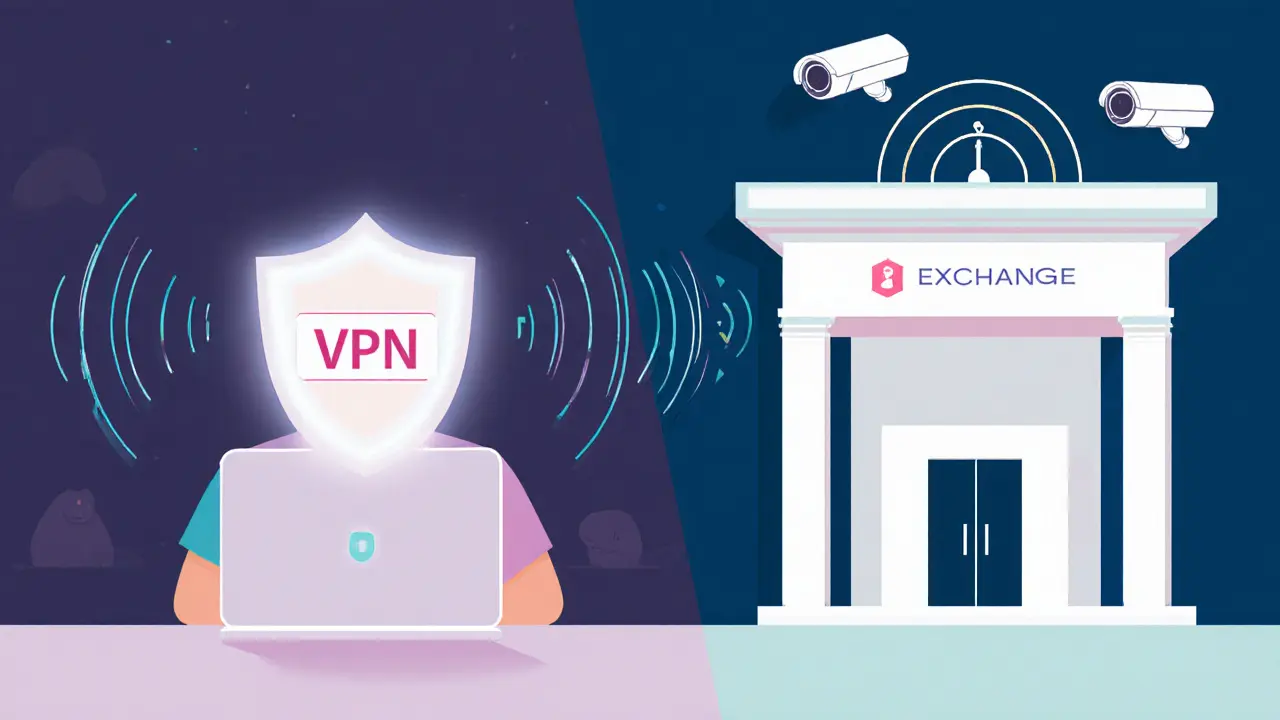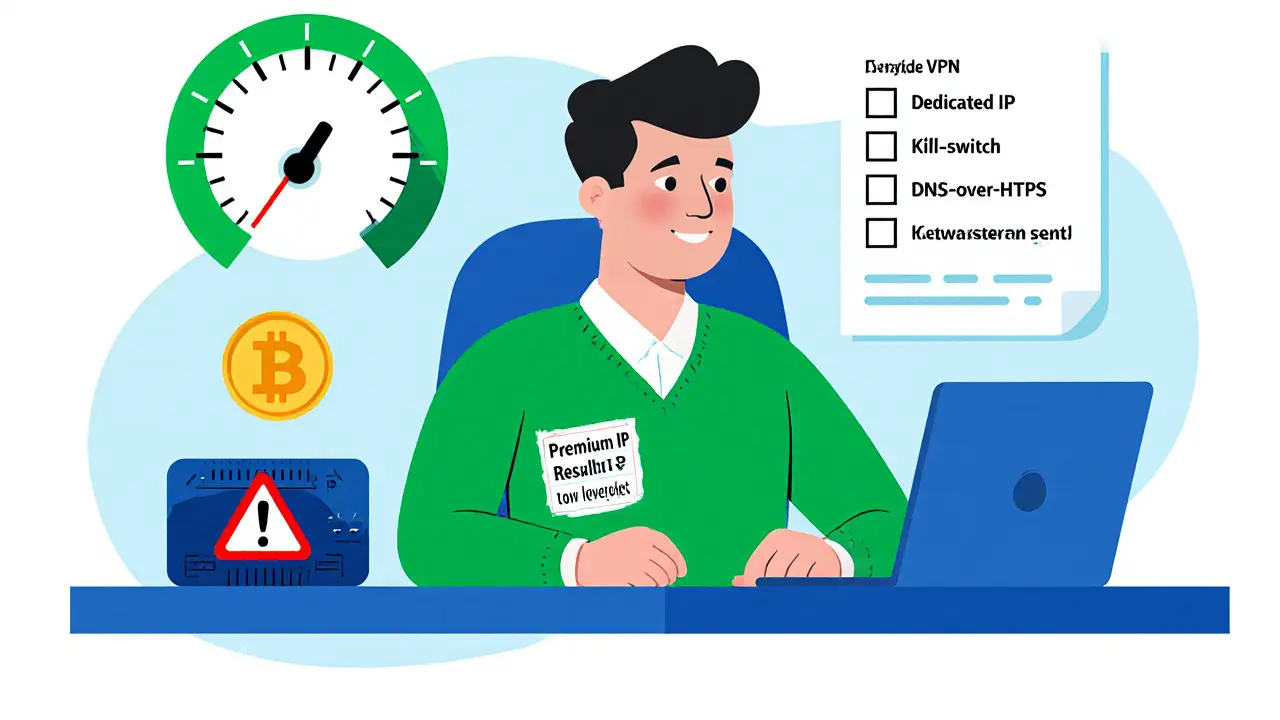How VPNs Impact Crypto Exchange Access and Detection Rates
 Jun, 20 2025
Jun, 20 2025
VPN Detection Rate Calculator
Estimate your risk of being detected by crypto exchanges when using a VPN.
When you try to log into a crypto exchange while hiding your real IP, you quickly discover that many platforms can still spot you. The cat‑and‑mouse game between VPN a virtual private network that encrypts your internet traffic and assigns you a different IP address and the security teams at exchanges has turned into a full‑blown arms race. Below we break down why exchanges detect VPNs, how often they succeed, and what you can do to stay both private and compliant.
Why Exchanges Hunt for VPN Traffic
Regulators in the US, EU, and many other jurisdictions require crypto platforms to know where their users are located. Crypto exchange an online platform that lets users buy, sell, or trade digital assets therefore need accurate geographic data to meet Know Your Customer (KYC) and Anti‑Money Laundering (AML) rules. A VPN masks that data, and in the eyes of a compliance officer it looks like a red flag for fraud, money‑laundering, or sanction evasion.
Beyond regulation, exchanges also want to protect their reputation. If a hacked account originated from a VPN, the platform could be blamed for weak security practices. By flagging VPN users, exchanges can apply extra verification steps that lower the chance of a breach slipping through.
How Detection Works: The Technical Toolbox
Modern exchange security stacks use several complementary methods. Below is a quick rundown of the most common vectors:
- IP reputation databases - Services maintain ever‑growing lists of IP ranges known to belong to VPN providers, especially free or shared‑hosted services.
- Geolocation inconsistency - If you log in from New York, then three minutes later from Berlin, the platform’s risk engine flags the jump as suspicious.
- DNS leak detection - Some VPNs fail to fully tunnel DNS requests, revealing the true ISP’s resolver.
- WebRTC fingerprinting - Browsers can expose local IP addresses through WebRTC APIs unless the VPN blocks them.
- Behavioral analysis - Machine‑learning models examine login times, device fingerprints, and trading patterns to differentiate genuine users from those hiding behind privacy tools.
When any of these signals appear, the exchange may trigger a ‘VPN detected’ flag. Depending on the platform’s policy, the flag can result in a temporary suspension, reduced withdrawal limits, or a full account lock pending manual review.
What the Numbers Actually Say
Industry reports frequently quote a 70‑80 % detection rate for VPN traffic, but the figure varies wildly by exchange size, jurisdiction, and VPN quality. Large, regulated platforms such as Binance, Coinbase, and Kraken typically achieve higher detection rates because they invest heavily in compliance‑driven tooling. Smaller or decentralized exchanges may only catch obvious free‑VPN traffic, leaving advanced privacy users untouched.
In practice, users of premium services see far fewer blocks than those on free VPNs. A 2025 analysis by PureVPN found that premium providers with dedicated IPs and residential‑type endpoints were identified in less than 30 % of their login attempts, while free‑VPN traffic was flagged over 80 % of the time.
Premium VPNs vs. Free VPNs: A Side‑by‑Side Look
| Feature | Premium VPN (e.g., NordVPN) | Free VPN (e.g., ProtonVPN free tier) |
|---|---|---|
| Dedicated IP option | Yes - static residential IPs in 50+ locations | No - shared pool of data‑center IPs |
| Latency (average ms) | 45‑70 ms (optimised servers) | 120‑200 ms (over‑loaded nodes) |
| Detection rate (average) | ≈ 30 % | ≈ 85 % |
| Crypto‑payment support | Bitcoin, Ethereum, Ripple, Litecoin, Tron | None |
| Kill‑switch & DNS leak protection | Always‑on kill‑switch, DNS leak guard | Basic kill‑switch, occasional DNS leaks |
The table makes clear why serious traders gravitate toward paid VPNs: they blend in better, stay faster, and let you pay with crypto - a neat privacy loop.
Real‑World Tactics for Staying Under the Radar
If you’re determined to use a VPN without getting locked out, try these practical steps:
- Pick a residential IP or dedicated IP - Services like NordVPN and Private Internet Access offer these for a modest surcharge.
- Avoid rapid location switches - Log in, do your trading, then disconnect before changing servers.
- Disable WebRTC - Most browsers have extensions that block the API, preventing hidden IP leaks.
- Use DNS over HTTPS (DoH) - Forces DNS queries through the VPN tunnel, eliminating ISP‑level leaks.
- Combine VPN with a residential proxy - For ultra‑stealth, route traffic through a real ISP address; this is pricey but effective.
Remember, every extra layer adds latency. Balance privacy with the need for fast order execution, especially during volatile market moves.

Security Benefits That Outweigh Detection Risks
Beyond evading exchange blocks, a VPN shields you from common crypto‑specific threats:
- Phishing sites that harvest login credentials.
- Man‑in‑the‑middle attacks on public Wi‑Fi, which could expose your API keys.
- Malicious downloads that embed keyloggers aimed at wallet seed phrases.
NordVPN’s suite includes dark‑web monitoring for leaked credentials, while ExpressVPN constantly updates its malware‑blocking DNS. Those features alone can save a trader thousands of dollars in stolen assets.
Regulatory Trends Shaping Future Detection
Governments are tightening crypto rules. The EU’s MiCA framework will demand proof of location for every transaction, and the US Treasury’s FinCEN proposals push for real‑time geolocation verification. As compliance pressure mounts, exchanges will upgrade their detection stacks-more AI, more cross‑referencing with external IP‑reputation feeds.
That means the 70‑80 % figure could rise, especially for low‑cost VPNs. Premium providers will need to keep innovating, perhaps by integrating “stealth” obfuscation protocols (like WireGuard‑obfs) that mimic ordinary traffic patterns.
Bottom Line Checklist for Crypto Traders Using VPNs
- Choose a paid VPN with dedicated or residential IPs.
- Pay with crypto if the provider supports it-keeps your fiat‑to‑crypto trail minimal.
- Enable kill‑switch, DNS leak protection, and block WebRTC.
- Limit server changes during active trading sessions.
- Be prepared to verify identity if the exchange flags you; keep all KYC documents handy.
Following this list gives you the best shot at staying private while still complying with the exchange’s security demands.
Can I use a free VPN to trade on major exchanges?
Free VPNs are usually flagged because they share IPs that appear on known‑VPN lists. Most big exchanges will either block the login or require extra verification. If you must use a free service, stick to one server and avoid rapid location changes, but expect a higher chance of suspension.
What’s the difference between a dedicated IP and a residential IP?
A dedicated IP is a static address assigned only to you on a data‑center server. It’s less likely to be on shared VPN blacklists but can still look like a data‑center. A residential IP comes from a real ISP, making it appear as a typical home user-this is the hardest type for exchanges to flag.
Will using a VPN protect me from phishing attacks?
A VPN encrypts your traffic, so attackers can’t intercept login credentials on insecure networks. However, it won’t stop you from clicking a fake login page. Combine a VPN with a reputable password manager and two‑factor authentication for full protection.
How can I test if my VPN leaks DNS or WebRTC?
Visit sites like dnsleaktest.com or ipleak.net while the VPN is active. They will show the IP address seen by DNS resolvers and any WebRTC‑exposed addresses. If you see your ISP’s IP, enable the VPN’s DNS leak protection or install a WebRTC‑blocking extension.
Is it legal to use a VPN for crypto trading?
Using a VPN is legal in most jurisdictions, including New Zealand, the US, and the EU. The issue is compliance: if an exchange requires a verified location, you must still provide accurate information during KYC, even if you hide your IP for everyday browsing.
Lawrence rajini
October 25, 2025 AT 23:41VPN + crypto is the ultimate power move 😎 but free ones are just asking for trouble. I tried ProtonVPN free last week and got locked out of Binance before I could even place an order. Premium is worth every penny if you’re serious about trading.
Will Barnwell
October 26, 2025 AT 15:37Yeah right, like anyone actually cares about privacy anymore. You’re just trying to dodge KYC so you can wash dirty coins. Stop pretending this is about security - it’s about evasion.
Matt Zara
October 27, 2025 AT 01:57Hey I get where Will’s coming from but let’s not villainize people who just want to protect their data. I use NordVPN on public Wi-Fi at coffee shops - my API keys are safer because of it. Not everyone’s trying to break the law. 🤝
Jean Manel
October 27, 2025 AT 10:1370% detection rate? That’s pathetic. If you’re using anything but a $20/month residential IP service, you’re basically waving a red flag and yelling ‘I’m laundering!’ to every exchange’s AI. You’re not private - you’re predictable.
William P. Barrett
October 28, 2025 AT 01:45It’s funny how we treat privacy like a moral choice. The truth is, exchanges aren’t hunting VPNs because they care about compliance - they’re doing it because they’re scared of being hacked. The real issue isn’t your IP - it’s their insecure systems.
Cory Munoz
October 28, 2025 AT 11:49Been using Mullvad for a year now. Never had an issue with Kraken. Just stick to one server, turn on kill switch, and don’t be a jerk switching locations every 5 mins. Simple stuff. 🙏
Jasmine Neo
October 28, 2025 AT 12:20US-based traders using VPNs to bypass geofencing? That’s not privacy - that’s fraud. If you’re not in the jurisdiction, you shouldn’t be trading. Stop pretending your ‘crypto freedom’ justifies breaking rules. This isn’t crypto-anarchist Reddit - it’s regulated finance.
Ron Murphy
October 28, 2025 AT 21:15Residential IPs are the only way to fly. I use a paid service that routes through actual home broadband in London. No flags, no delays, no drama. Free VPNs are like driving a bike with a broken brake - you might get somewhere, but you’ll crash.
Prateek Kumar Mondal
October 29, 2025 AT 10:11Use paid VPN and pay with crypto if possible. Simple. No drama. No need to overthink it. Just do it
Nick Cooney
October 29, 2025 AT 12:22Wait so you’re telling me I have to pay for a VPN to not get flagged… but I can’t pay with fiat because that leaks my identity… so I have to buy crypto to pay for the tool that lets me use crypto? The irony is thicker than a 2024 memecoin rugpull.
Clarice Coelho Marlière Arruda
October 30, 2025 AT 09:18i used a free vpn once and got flagged and then had to send them my drivers license and a selfie holding it… why do i even bother
Brian Collett
October 30, 2025 AT 11:12WebRTC leak? Bro I just use Brave browser and it blocks it by default. No extensions needed. Also DNS over HTTPS is built into Windows 11 now. Stop overcomplicating this.
Allison Andrews
October 30, 2025 AT 18:07If the system is designed to punish privacy, maybe the system is broken - not the user. We treat anonymity like a crime, but the real crime is centralized control. What happens when every action is tracked, traced, and taxed? We’re not just fighting VPN blocks - we’re fighting the erosion of digital autonomy.
Wayne Overton
October 31, 2025 AT 01:19Free VPNs are trash. Just use a paid one. Done.